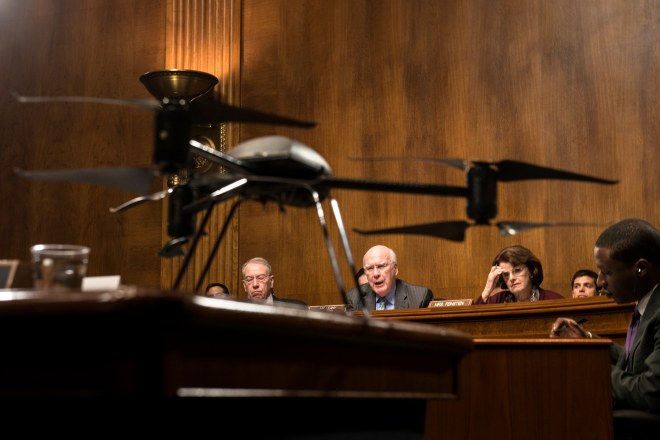Daniel Klaidman reports that the White House is ready to transfer control of the drone program from Langley to the Pentagon:
The proposed plan would unify the command and control structure of targeted killings and create a uniform set of rules and procedures. The CIA would maintain a role, but the military would have operational control over targeting. Lethal missions would take place under Title 10 of the U.S. Code, which governs military operations, rather than Title 50, which sets out the legal authorities for intelligence activities and covert operations.
But it probably won’t satisfy critics of the program’s secrecy:
For one thing, targeted killing operations will likely be run by the highly secretive Joint Special Operations Command, the umbrella organization for shadow warriors like the Navy SEALs and Delta Force. And while they run clandestine, rather than covert operations, JSOC is not known for its eagerness to advertise its operations with the press or Congress.
In fact, there’s at least a chance that the change could mean less congressional oversight rather than more. There’s nothing in the law that says the military has to brief congressional committees about its lethal activities. The CIA, on the other hand, is compelled under Title 50 to notify Congress of its intelligence activities.
Dashiell Bennett has more on those legal distinctions. Ackerman suggests that the new policy is a red herring:
What matters more than which bureaucratic entity operates the drones is what the politicians ostensibly in charge of those bureaucracies want to do with them. Sen. Rand Paul (R-Kentucky)’s 13-hour filibuster earlier this month vented congressional dissatisfaction with the secrecy, scope and intensity of the global targeted-killing program. It remains to be seen if Paul and his colleagues wish to trim the edges of that lethal program or constrain it more substantially. Congress has been more bellicose than the Obama administration.
(Photo: Committee ranking member US Senator Chuck Grassley (L) and Senator Dianne Feinstein (R) listen as committee chairman Senator Patrick Leahy (C) speaks during a hearing of the Senate Judiciary Committee on Capitol Hill, March 20, 2013 in Washington, DC. The committee called drone industry experts to testify about the future use of drones in law enforcement. By Brendan Smialowski/AFP/Getty Images)
